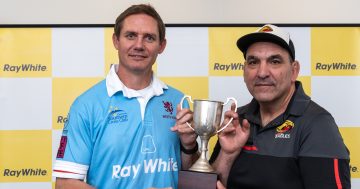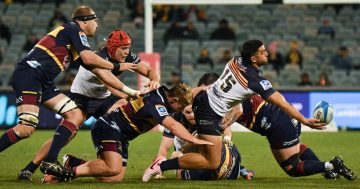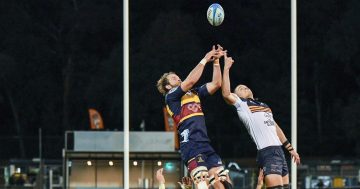
There are likely to be lessons that professional teams, such as the Brumbies, can learn from local clubs. Photo: Tim Gavel.
The rugby club I have an involvement with in Canberra held a heritage game recently to emphasise and celebrate the links between the past and the present. It was a reminder of the contribution of those who have gone before. And it was a reminder of the established processes and practices put in place that the current day players benefit from. It was a celebration of what the club had become because of the contribution of so many people at so many levels over the years, many of who still engage with the club.
The feats of the former players are often elevated into the stratosphere; the hardest, the toughest, the fastest; you get my drift. And often the former players have nicknames that reflect minor characteristics, mistakes or events. A player might have dropped the ball during a critical move and he or she is suddenly, in a good-natured way, known as ‘buckets’ for the rest of their life. The nickname often traversing codes and states.
What I have found is that there is a certain reality check with grassroots sport. This can become clouded in professional sport where players are associated with their ‘brand’ and it all takes on a corporate feel.
When the pay is large and the conditions are corporate, the game has a different emphasis. Don’t get me wrong; the professional game is important. But sometimes I can’t help but wonder whether it could be brought back a little and reconnect with people in the way that local sport seems to do so well. I think some professional players really yearn for this and maintain a strong link with their local club even when they have reached the dizzy heights of professionalism. I’m thinking of Steve Larkham who would run the water or the kicking tee out to the field when his local team, Wests, were playing and when he wasn’t busy with the Brumbies.
I would imagine some professional players often get greater enjoyment out of playing in a local competition, away from the generated hype. The grassroots players also seem to enjoy testing themselves against the better-known players. And there is also the good-natured crowd banter towards the opposition supporters and often their own team.
It is what sport is all about; a sense of being a part of something. A bit of a laugh with friends, a sausage sandwich, a drink after the game without repercussions, and the sharing of exaggerated stories and experiences exchanged because you all support a team and a club.
I write this column in the wake of the many comments about the reasons why people weren’t going to Brumbies games because of a perceived disconnect with the supporter base.
Much of what I have written about here isn’t possible at the professional level, and much of it is not the fault of the Brumbies, as they have restrictions at many levels.
At the local level though, you don’t have ground announcers telling you when to cheer for your team or music blaring between play. You get to interact with the players a lot more. There is little of the overhyped animosity often generated by the media to create interest and you get to chat with the people in the canteen when you buy something that isn’t overpriced.
As I said at the outset, professional sport can learn plenty from the grassroots, which is thriving. And this is because of the hard work of people passionate about their club, whatever the sport, or regardless of whether the team is winning or losing.





















